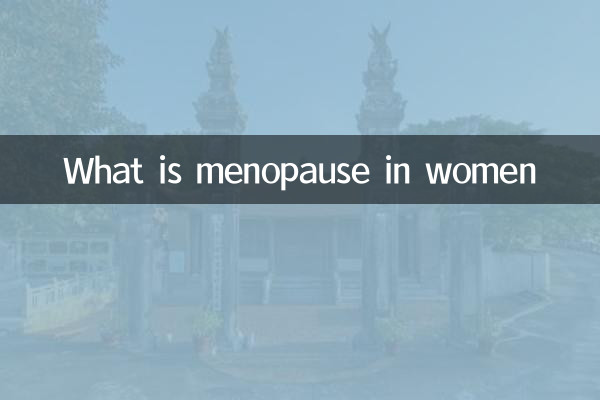What is menopause in women
Menopause is an important stage in a woman's life that usually occurs between the ages of 45 and 55 and marks the end of fertility. This stage is accompanied by changes in hormone levels, especially a decrease in estrogen, which may trigger a series of physical and psychological symptoms. In recent years, discussions about menopause have become a hot topic, especially how to scientifically deal with menopausal symptoms and maintain a healthy lifestyle.
The following are the hot topics and hot content about menopause on the Internet in the past 10 days:

| hot topics | focus of discussion | Related data |
|---|---|---|
| menopausal symptoms | Hot flashes, insomnia, mood swings | About 75% of women experience hot flashes |
| hormone replacement therapy | Controversy over safety and effectiveness | 30%-50% of women try hormone therapy |
| naturopathy | Diet modification and exercise | Soy isoflavones can relieve symptoms by 20%-30% |
| mental health | Coping with Anxiety and Depression | 40% of more women report emotional problems |
The three stages of menopause
Menopause does not happen overnight, but is a gradual process that can be divided into three stages:
| stage | time range | Main features |
|---|---|---|
| perimenopause | 2-8 years before menopause | Irregular menstruation and hormone fluctuations |
| menopause | No menstruation for 12 consecutive months | Estrogen levels drop significantly |
| postmenopausal | years after menopause | Relief of symptoms and increased risk of osteoporosis |
Common symptoms of menopause
Symptoms of menopause vary from person to person, but these are the most common ones:
| Symptom type | Specific performance | incidence |
|---|---|---|
| vasomotor symptoms | Hot flashes, night sweats | 70%-80% |
| Psychoneurological symptoms | Mood swings, memory loss | 50%-60% |
| genitourinary symptoms | Vaginal dryness and frequent urination | 40%-50% |
| Other symptoms | joint pain, headache | 30%-40% |
How to deal with menopause scientifically
When facing menopause, women can take the following steps to relieve symptoms and stay healthy:
| coping style | Specific methods | effectiveness |
|---|---|---|
| lifestyle adjustments | Regular exercise and balanced diet | Can reduce symptoms by 30%-50% |
| psychological support | Psychological counseling, social activities | Improve emotional problems by 60%-70% |
| medical intervention | Hormone therapy, traditional Chinese medicine | Requires professional evaluation before use |
Healthy eating advice for menopause
Diet plays an important role in easing menopausal symptoms, and here are some key tips:
| food category | Recommended food | Mechanism of action |
|---|---|---|
| Calcium-containing foods | Milk, sesame seeds, green leafy vegetables | Prevent osteoporosis |
| Phytoestrogens | Soybeans, flax seeds | Relieve hot flash symptoms |
| Vitamin-rich foods | Fruits, whole grains | Enhance immunity |
| Hydration | Water, light tea | Prevent dehydration |
Menopause and long-term health
Menopause not only brings short-term symptoms, but is also closely related to women's long-term health. Studies have shown that women after menopause have an increased risk of cardiovascular disease and an increased incidence of osteoporosis. Therefore, it is particularly important to establish healthy living habits, conduct regular physical examinations, and pay attention to bone density and cardiovascular health indicators.
In short, menopause is a natural physiological process for women. Through scientific understanding and reasonable response, we can go through this stage smoothly and maintain physical and mental health.

check the details

check the details